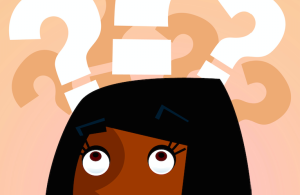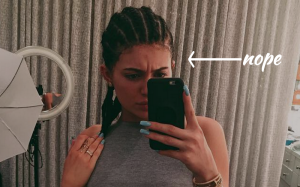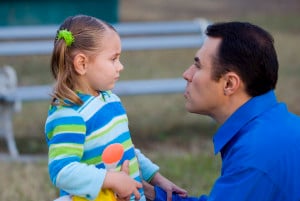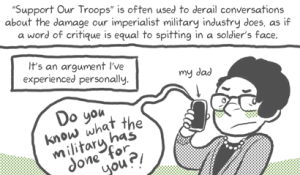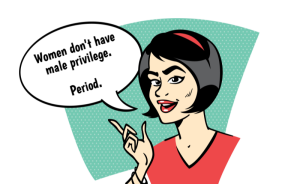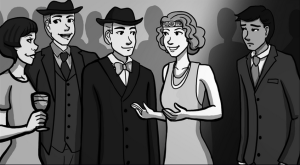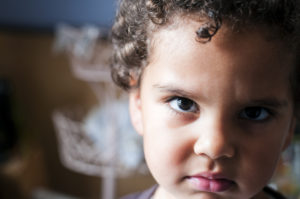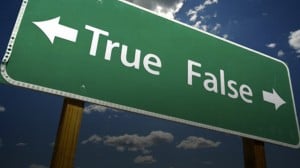Originally published on Native Appropriations and republished here with the author’s permission.
Let’s set the scene.
You walk into school/work/a Halloween party and are having an awesome day because it’s Halloween and you’re wearing an awesome costume that has something to do with a current event (without doing something like this or this), or a play on words, or a nerdy reference… because those are the best kind of costumes, duh.
Then, in the middle of your joyous revelry, you spot it. Across the room. A friend (or acquaintance, or stranger – let’s not discriminate), dressed as an “Indian.”
You know what it looks like.
The “buckskin,” the beads, the feathers – probably a headdress of some sort. Maybe some warpaint. Then, if you’re anything like me, you mentally go, “Aw, @#$%.”
So now let’s shift to what I go through in these situations, and all of the steps and checks I go through before I engage.
Because as I’ve mentioned before, despite my ability to talk about these issues on here day in and day out, I’m bad at these conversations in real life. I’m getting better, though.
Remind me to tell you sometime about my encounter with a Fox News correspondent at DFW airport…
Step #1. Who Is the Person Dressed Up as an Indian?
I’ll take a second look.
Do I know them? How well do I know them? Are they older than me? Are they younger than me? Are they under the age of 10 (so clearly their parents dressed them)? Is it my boss or someone who has a position of authority that can affect my future life/career?
All of those pieces change the way I’ll approach the situation.
I don’t scold children (duh – please don’t go yell at a three-year-old about cultural appropriation). I think carefully about how my encounter with this person can play out in my future relationships.
No one likes to be told they’ve done something hurtful, and these conversations are sticky no matter what.
So I do take the time to stop and think.
None of those situations stop me from talking to the person (except maybe the babies). I just approach it differently.
Step #2. Am I Going to Engage?
I don’t argue that you have to be the costume police every moment of every day.
Yes, I would love everyone to be comfortable confronting racism and cultural appropriation every time they see it, but it’s hard. And scary.
So I take a deep breath and take stock of how I’m feeling in the moment.
Am I ready to go in? Am I feeling strong and comfortable with my facts and responses to the inevitable push back? Am I hungry? Have I been drinking? Have they been drinking? Do I have a friend or two that is going to come with me and support me?
Even: What’s on the snack table? Would I like a cookie first? Maybe I’d like a cookie first. Maybe they’ll see my angry glare from across the room and just leave as I eat this delicious pumpkin shaped cookie.
In all honesty, I don’t confront folks in person a lot.
I’m much more comfortable (if I know them) sending them an e-mail later where I can lay out my thoughts and feelings, link to some resources, and let the conversation grow that way.
Step #3. Prepare for the Response
I’m saying this from experience: If I go up to someone at a party, and tell them their costume is hurtful and offensive, they’re not going to thank me and take off the headdress.
The first response, 99.9% of the time, will be defensiveness.
Which, of course, makes sense. They’re standing there in a skimpy costume with warpaint on, they’re going to be embarrassed. They’re going to defend their choice.
Here is exactly what they will say to you. People aren’t original with how they defend their costumes. And here are things you can say back.
Feel free to change “us” to “them” if you’re non-Native, and realize when I say these things in person, they’re accentuated with a lot of “um” “like” and long awkward pauses.
Remember: Use “I” phrases (that is, “I’m hurt by your costume,” “I feel,” and “I think”) rather than “You’re a dirty racist!” That doesn’t work.
“I didn’t do it to be offensive.”
I know. I realize you didn’t pick the costume to be offensive. I’m not saying you’re a bad person.I’m just saying that these costumes are really hurtful to Native peoples, because they turn us into fantasy creatures based on harmful stereotypes.
“Dude, get over it. You’re being way too sensitive. It’s just Halloween.”
It might be “just” Halloween, but these issues play out all year as well. The costumes and stereotypes are just symptoms of much deeper issues. (If you want the fuller response to this, which is better suited for e-mail conversation, see the end of this post)
“Again, get over it.”
Again, I’m just saying that your costume is hurtful and offensive to Native peoples, and that you might want to reconsider wearing it next time. But telling me to “get over it” doesn’t help the situation.
“I’m Irish, and I don’t get offended by that dude in a leprechaun costume over there.”
That’s good. But a leprechaun isn’t a real person, and there’s not a contemporary community of Leprechauns who are undergoing active colonialism and actively fighting misrepresentations.
I totally feel for all those leprechauns living in poverty while the US government continues to systematically marginalize them through ongoing policies that ignore their inherent sovereignty and Indigenous rights to the land.
While the Irish may have had a history of oppression in the US, no one can argue that they are still marginalized or would be categorized as anything other than part of the majority culture.
If that’s too wordy?
Dude, Leprechauns aren’t real people.
“I’m Pocahontas/Tiger Lily/an Indian from Peter Pan/a historic figure/other fictional character!”
That’s cool, but all of those were based off of the same hurtful stereotypes.
Have you seen Peter Pan? “What makes the red man red?” Really? Pocahontas might seem like a “good” stereotype, but she’s still an oversexualized woman who talks to animals and trees and is only famous because she saves a white dude.
If you were the “real” Pocahontas, you’d also be 9-12 years old.
“But are zombies offensive to the zombie peoples? What about cowboys? Doctors?”
Zombies are not real (yet). Cowboys and doctors are a profession. Not a group of marginalized people. Yes, I think geisha costumes, Mexican costumes, pimp costumes, and any other racialized costume are offensive, too.
And their trump card, always:
“I’m Cherokee Indian, so get off my back!”
Alternatively, this could be worded as “My great-great-grandma was Cherokee (maybe even a princess!), so get off me.”
This is my favorite. Because then I go, “ᎣᏍᏓ! ᎣᏏᏲ! ᏣᎳᎩᏍ ᎯᏬᏂᏍᎩ?” (“Osda! Osiyo! Tsalagis hiwonisgi?” “Good! Hello! Do you speak Cherokee?”), which is really about the limit of my Cherokee language, but usually is plenty to freak them out.
But that might not work for all of you.
So maybe instead: That’s great. And I encourage you to learn more about your heritage, because Cherokee regalia looks nothing like that. We don’t wear plains warbonnets. And when you learn more, you’ll see that Cherokee folks who know and respect their heritage would not be walking around dressed like that.
If anything, being Cherokee holds you to a higher standard. This is not how I would honor my heritage, ever. Also, we don’t have, nor have we ever had, “princesses.” So you might want to check your facts.
Step #4. Think About What You’re Hoping for From the Conversation
Honestly, the best outcome is you get them to think.
That’s all I hope for, most of the time. I hope they’ll go to the bathroom at the party, catch themselves in the mirror and think, “Was this a bad idea?”
I can hope they’ll reconsider next time.
I can’t hope to change the way they think forever, but I can start them on the journey. I don’t ever expect the person to start crying and apologizing and to take off the costume right then and there. Though it can happen.
If you set your expectations before going in, you won’t feel beat down when it’s over.
Step #5. Engage
So I’ve decided to talk to the person. Deep breath. I think an easy opening line is “So, talk to me about your costume.”
Not accusatory right off the bat, gives you some time to assess how best to proceed.
But if I know them really well, I’ll go with: “Dude, what are you wearing? You know what I do and what I write about on the Internet all day, right?”
Step #6. Go Get Another Pumpkin Cookie
Because they’re seasonal and delicious.
If you decide an e-mail convo after the fact is easier, here are some handy resources from the blog for you:
- Open Letter to the Pocahotties (the annotated version)
- Your one stop for all your “Indian Costumes are Racist” needs!
- Open Letter to the PocaHotties and Indian Warriors This Halloween
- But Why Can’t I Wear a Hipster Headdress?
- Nudie Neon Indians and the Sexualiztion of Indian Women
- A Cowboys and Indians Party is just as bad as a Blackface Party
- Paris Hilton as a Sexy Indian: The Halloween Fallout Begins (includes lots of links about the costume issue)
- Mid-Week Motivation: I am not your costume
And the long response to “why Halloween matters” (directly lifted from my “Why Tonto Matters” post, just swapped out “Halloween” for “Tonto” – because it’s my writing and I can do that, okay?):
Yes, unequivocally, we have big things to tackle in Indian Country. We have pressing and dire issues that are taking the lives of our men and women every day, and I am in absolutely no way minimizing this reality.
But we also live in a state of active colonialism.
In order to justify the genocide against Native peoples in this country, we must be painted as inferior – that’s the colonial game.
These images continue that process.
The dominant culture therefore continues to marginalize our peoples, to ignore and erase our existence. We are taught every day – explicitly in classrooms, and implicitly through messages from the media – that our cultures are something of the past, something that exists in negative contrast to “western” values, and something that can be commodified and enjoyed by anyone with twenty dollars to buy a cheap plastic headdress.
These stereotypical images like your Halloween costume feed into this ongoing cycle, and until we demand more, our contemporary existence (and therefore the “real” problems in Indian Country) simply doesn’t exist in the minds of the dominant culture.
How can we expect mainstream support for sovereignty, self-determination, Nation Building, tribally-controlled education, healthcare, and jobs when the 90% of Americans only view Native people as one-dimensional stereotypes, situated in the historic past, or even worse, situated in their imaginations?
I argue that we can’t – and that, to me, is why Halloween matters.
***
The long (and angry) response to “get over it”:
You know why I can’t get over it?
Because when I look at you in your bastardized version of my culture, I can’t help think about my ancestors.
Who wore clothing maybe something like what you’re trying to imitate, albeit not cheap ass fabric from the costume shop, and were considered “savages” and “animals” by the US.
Whose lives were considered disposable. Who were considered impediments to the “march of progress.” Who were slaughtered by the millions by disease and weapons brought by colonialism.
I think about the thousands of Indian children, including my family, forcibly sent to government-run boarding schools where when they showed up wearing an outfit like yours, they were forced to wear western clothing, have their braids cut, and would be beaten if they spoke their Native languages.
The goal was to erase all of their culture, to “kill the Indian,” but “save the man.” I see you with your “peace pipe” and “eagle feathers” and think about how until 1978, Native peoples weren’t allowed to practice our own spirituality with those objects because it was illegal.
Today, the ongoing issues in our communities are direct results of these colonial practices, and it hasn’t slowed down. This isn’t ancient history. This is present day.
Now, it’s suddenly “cool” and “trendy” to rock Native “costumes?” So society is saying, “Hey Natives, we had the power to convince everyone that your cultures were savage and backward, but guess what! Now we have the power to change our minds. Those things we thought were so bad? We miss them. But of course, you have no power over this situation.
“No matter what, you – as silly primitive beings – can’t change how we portray you. Your cultures and identities are ours to control. And while we’re at it? All those cultural markers of clothing, jewelry, and spirituality that we’re now so anxious to buy? We’re gonna make them ourselves. Or a factory in China is going to make them. So really, we don’t actually need you now either.”
So yeah, you might think you’re “honoring” us, or being “respectful,” but I look at you and just see you honoring a legacy of colonialism that openly tried to erase my people from the planet.
That’s not respect. So no, I’m not going to get over it.
***
Oh, and if you’re not sure if your costume is racist? A handy flow chart.
If you have any firsthand stories you’d like to share, or other techniques, feel free to share in the comments. I know this isn’t perfect, by any means. Happy Halloween!
[do_widget id=’text-101′]
Adrienne Keene is a citizen of the Cherokee Nation and a Postdoctoral Fellow in Native American Studies at Brown University. Through her blog Native Appropriations (nativeappropriations.com), she is deeply interested in representations of Native peoples in the media and pop culture, including issues of cultural appropriation, and how Indigenous peoples use social media for activism and speaking out against misrepresentation.
Search our 3000+ articles!
Read our articles about:
Our online racial justice training
Used by hundreds of universities, non-profits, and businesses.
Click to learn more
Most Read Articles
- « Previous
- 1
- …
- 30
- 31
- 32


